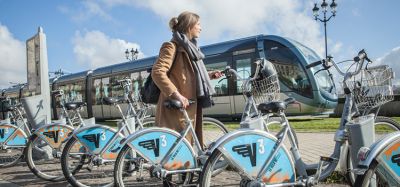The importance of data in MaaS
- Like
- Digg
- Del
- Tumblr
- VKontakte
- Buffer
- Love This
- Odnoklassniki
- Meneame
- Blogger
- Amazon
- Yahoo Mail
- Gmail
- AOL
- Newsvine
- HackerNews
- Evernote
- MySpace
- Mail.ru
- Viadeo
- Line
- Comments
- Yummly
- SMS
- Viber
- Telegram
- Subscribe
- Skype
- Facebook Messenger
- Kakao
- LiveJournal
- Yammer
- Edgar
- Fintel
- Mix
- Instapaper
- Copy Link
Posted: 14 October 2017 | James Datson | No comments yet
James Datson, Principle Technologist at Transport Systems Catapult, explains how data sharing and analysis have a key part to play in the coming MaaS revolution.


MOBILITY-AS-A-SERVICE (MaaS) holds a great deal of promise for the UK transport sector. As a new way of providing more personalised transportation, it could break our reliance on car ownership while providing potential cost savings and a public transport system that better supports traveller requirements.
MaaS also has the potential to make a significant contribution to the UK service sector, generating jobs and economic growth. This growth will be driven by new business opportunities that support our mobility and lifestyle needs.
The result could mean increased mobility for all in society and more reliable services for commuters, reducing delays and congestion rather than adding to them. Increased options for rural travellers who are currently reliant on the car as their sole means of transportation are also possible.
Data deluge
For local authorities and policy makers, the potential to use MaaS to source data on travel movements could open the door to a more efficient use of capacity and new transport management tools.
By the end of 2020, there will be over 50 billion connected devices globally collecting over 2.3 zettabytes of data each year. MaaS leverages on this opportunity and is an example of a business model that is supported by the growth in smartphone use. MaaS is a digital, data-driven service that uses a number of technological capabilities that are associated with intelligent mobility innovation. It relies on building an ecosystem of stakeholders that, together, agree to manage the supply and demand of the services that travellers want.
The MaaS ecosystem includes data providers that act as brokers to aggregate data from a multitude of operators to support the services of MaaS providers. They offer both data transfer and analytic capabilities. This includes processing, repackaging and publishing data to support information on routes, payment, pricing, and the real-time position of transport services.
In order to buy into MaaS, the customer will be looking for a simple interface to handle all of the pain points traditionally associated with multimodal travel, while also providing a level of convenience in terms of the planning and execution of travel to rival car ownership. The MaaS providers in the ecosystem focus on customer experience and delivery, and also give operators a simple way of offering their services to MaaS subscribers. Data flow and feedback will be crucial to the whole system in growing and benefiting from network effects. However, the lack of data sharing in the current system provides a big headache for potential MaaS providers who want to face the travelling customer and provide a better travel offer.
Time to share
We see that travellers support the use of their data by the MaaS ecosystem: a recent study shows that 57 per cent of respondents would not mind sharing their personal data in order to get a better transport service; approximately half of smartphone users already consider the smartphone as essential to their travel experience.
Shared and open data gathered from smart devices and connected infrastructure will underpin mobility solutions that support integrated, efficient and sustainable transport systems. Much of the data exists but is not shared. We have to find new ways of making data accessible in a way that protects privacy, takes into account cybersecurity concerns and most importantly makes commercial sense.
Although the UK marketplace for MaaS is estimated as being worth billions of pounds per year, if stakeholders in the MaaS ecosystem don’t find a way through the ‘prisoner’s dilemma’ challenge, MaaS growth may be slow.
Overcoming complexity
The evolution of transport provision has resulted in a complex network of private and public organisations working separately and often being regulated by ‘mode’. Taking the rail sector as an example; the private sector companies that build and maintain tracks are employed by a public sector organisation that owns the infrastructure and charges private sector companies, that enjoy franchises let by the government, to use the tracks. Train operating companies run trains that are owned by separate companies that purchase rolling stock from an international supply chain of manufacturers.
Parking at rail stations is important to many rail passengers but is operated by yet more third-party companies. And when we look at the payment experience, the techniques of yield management used in other transport sectors, like airlines, are little used, and most passengers still have to buy and carry paper tickets, some regulated by laws stretching back to the nineteenth century. Looking at the rail sector alone, we see the business case for different organisations to engage in MaaS as complex and not without risk.
These examples of the challenges constraining MaaS growth result in a lack of data sharing between transport operators, but it is important to understand that data sharing is not just a yes or no decision.
Data, of course, can be shared in many ways on the spectrum, between open-to-all, to always closed, and a variety of approaches to sharing it in between. For MaaS to grow we need to see more examples of cooperative competition as businesses work together to exploit the MaaS opportunity, sharing data in ways that work for them.
As our transport system is, in fact, a system of systems, optimisation at the level of the mode silo is done at the expense of the overall network. Data sharing is a requirement for system optimisation and will eventually flow as a result of business strategists agreeing that the MaaS business case can work.
In the meantime, MaaS innovation is at risk due to a lack of data sharing. Fears around cybersecurity, a lack of data literacy skills and a legacy of viewing transport modes as isolated businesses, are just some of the barriers. This lack of data sharing is preventing the UK from unlocking the full potential of its transport network and moving to a more efficient and optimised system powered by MaaS. Our recent research with the Open Data Institute and Deloitte found that overcoming these barriers could unlock £14 billion of benefits from new innovations by 2025. We believe that supporting investors to find win-win outcomes in MaaS is a must if we are to realise this potential.
In September 2017, the TSC announced the launch of the Intelligent Mobility Data Hub (IMDH), which provides a neutral, secure platform for transport organisations to allow access to and analyse their data. The hub currently stores many valuable data sets from government organisations, transport and technology businesses, offering multiple insights into road travel and haulage patterns in the UK.
Businesses will be able to use the facility to work with SMEs and research organisations to create transport innovations. Existing data sets can be combined for the first time to help create solutions for transportation issues such as congestion, pollution and journey planning.
Partners who use the facility have access to powerful IT infrastructure for data analysis and a team of experts to help them. The platform also features highly secure storage and robust legal processes to ensure privacy and commercial confidentiality to allow partners’ data to be stored and analysed.
Biography


Related topics
Cyber-Security, Multimodality
Issue
IT Issue 1 2017
Related organisations
Transport Systems Catapult
Related people
James Datson








